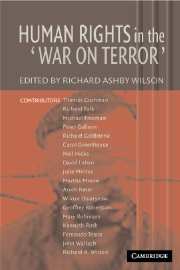Book contents
- Frontmatter
- Contents
- List of Contributors
- Acknowledgements
- HUMAN RIGHTS IN THE ‘WAR ON TERROR’
- Introduction
- 1 Order, Rights and Threats: Terrorism and Global Justice
- 2 Liberal Security
- 3 The Human Rights Case for the War in Iraq: A Consequentialist View
- 4 Human Rights as an Ethics of Power
- 5 How Not to Promote Democracy and Human Rights
- 6 War in Iraq: Not a Humanitarian Intervention
- 7 The Tension between Combating Terrorism and Protecting Civil Liberties
- 8 Fair Trials for Terrorists?
- 9 Nationalizing the Local: Comparative Notes on the Recent Restructuring of Political Space
- 10 The Impact of Counter Terror on the Promotion and Protection of Human Rights: A Global Perspective
- 11 Human Rights: A Descending Spiral
- 12 Eight Fallacies About Liberty and Security
- 13 Our Privacy, Ourselves in the Age of Technological Intrusions
- 14 Are Human Rights Universal in an Age of Terrorism?
- 15 Connecting Human Rights, Human Development, and Human Security
- 16 Human Rights and Civil Society in a New Age of American Exceptionalism
- Index
- References
8 - Fair Trials for Terrorists?
Published online by Cambridge University Press: 18 August 2009
- Frontmatter
- Contents
- List of Contributors
- Acknowledgements
- HUMAN RIGHTS IN THE ‘WAR ON TERROR’
- Introduction
- 1 Order, Rights and Threats: Terrorism and Global Justice
- 2 Liberal Security
- 3 The Human Rights Case for the War in Iraq: A Consequentialist View
- 4 Human Rights as an Ethics of Power
- 5 How Not to Promote Democracy and Human Rights
- 6 War in Iraq: Not a Humanitarian Intervention
- 7 The Tension between Combating Terrorism and Protecting Civil Liberties
- 8 Fair Trials for Terrorists?
- 9 Nationalizing the Local: Comparative Notes on the Recent Restructuring of Political Space
- 10 The Impact of Counter Terror on the Promotion and Protection of Human Rights: A Global Perspective
- 11 Human Rights: A Descending Spiral
- 12 Eight Fallacies About Liberty and Security
- 13 Our Privacy, Ourselves in the Age of Technological Intrusions
- 14 Are Human Rights Universal in an Age of Terrorism?
- 15 Connecting Human Rights, Human Development, and Human Security
- 16 Human Rights and Civil Society in a New Age of American Exceptionalism
- Index
- References
Summary
The title of this chapter, ‘Fair Trials for Terrorists?’, is oxymoronic. The trial of anyone already labelled a terrorist cannot, by definition, be fair. But the first casualty of war is always logic. The Pentagon's original brand name for its bombing of Afghanistan was ‘Operation Infinite Justice’, which makes no sense because human justice is both finite and fallible. It has to be fair, of course, otherwise it is not justice; and it has to be expeditious (see Magna Carta) and it should be effective, even if that today increasingly means ‘cost effective’. This chapter argues that the justice we dispense to alleged terrorists cannot be exquisitely fair, but need not be rough. Above all, it must be justice that conforms to the definition our inherited Anglo-American traditions have provided; essentially, a genuine adversary process determined by judges who are independent of the prosecuting authority.
The acute problem we face is how to achieve fair trials for men and women who are demonized by the society from which their judges and jurors are drawn. In the United Kingdom, we have been trying terrorists unfairly for centuries, but at least they have been tried in courts. Whatever label is given to the proceedings in Guantanamo Bay, before ‘special military commissions’, they do not appear to be taking place in a forum that satisfies the generally agreed definition of a court, although they are proceedings of an adversary nature and are thus far being held in public.
- Type
- Chapter
- Information
- Human Rights in the 'War on Terror' , pp. 169 - 183Publisher: Cambridge University PressPrint publication year: 2005



